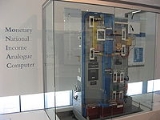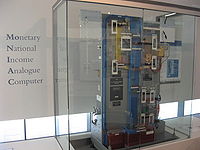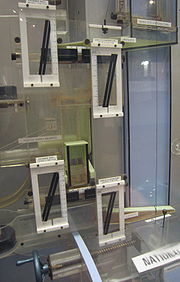
MONIAC Computer
Encyclopedia

New Zealand
New Zealand is an island country in the south-western Pacific Ocean comprising two main landmasses and numerous smaller islands. The country is situated some east of Australia across the Tasman Sea, and roughly south of the Pacific island nations of New Caledonia, Fiji, and Tonga...
economist Bill Phillips (William Phillips)
William Phillips (economist)
Alban William Housego "A. W." "Bill" Phillips, MBE was an influential New Zealand economist who spent most of his academic career at the London School of Economics . His best-known contribution to economics is the Phillips curve, which he first described in 1958...
to model the national economic processes of the United Kingdom
United Kingdom
The United Kingdom of Great Britain and Northern IrelandIn the United Kingdom and Dependencies, other languages have been officially recognised as legitimate autochthonous languages under the European Charter for Regional or Minority Languages...
, while Phillips was a student at the London School of Economics
London School of Economics
The London School of Economics and Political Science is a public research university specialised in the social sciences located in London, United Kingdom, and a constituent college of the federal University of London...
(LSE), The MONIAC was an analogue computer which used fluidic logic
Fluidics
Fluidics or Fluidic logic is the use of a fluid to perform analog or digital operations similar to those performed with electronics.The physical basis of fluidics is pneumatics and hydraulics, based on the theoretical foundation of fluid dynamics...
to model the workings of an economy. The MONIAC name may have been suggested by an association of money
Money
Money is any object or record that is generally accepted as payment for goods and services and repayment of debts in a given country or socio-economic context. The main functions of money are distinguished as: a medium of exchange; a unit of account; a store of value; and, occasionally in the past,...
and ENIAC
ENIAC
ENIAC was the first general-purpose electronic computer. It was a Turing-complete digital computer capable of being reprogrammed to solve a full range of computing problems....
, an early electronic digital computer.
Description

Economy
An economy consists of the economic system of a country or other area; the labor, capital and land resources; and the manufacturing, trade, distribution, and consumption of goods and services of that area...
and the flow of money around the economy was illustrated by coloured water. At the top of the board was a large tank called the treasury. Water (representing money) flowed from the treasury to other tanks representing the various ways in which a country could spend its money. For example, there were tanks for health and education. To increase spending on health care a tap could be opened to drain water from the treasury to the tank which represented health spending. Water then ran further down the model to other tanks, representing other interactions in the economy. Water could be pumped back to the treasury from some of the tanks to represent tax
Tax
To tax is to impose a financial charge or other levy upon a taxpayer by a state or the functional equivalent of a state such that failure to pay is punishable by law. Taxes are also imposed by many subnational entities...
ation. Changes in tax rates were modeled by increasing or decreasing pumping speeds.
Savings
Saving (money)
Saving is income not spent, or deferred consumption. Methods of saving include putting money aside in a bank or pension plan. Saving also includes reducing expenditures, such as recurring costs...
reduce the funds available to consumers and investment
Investment
Investment has different meanings in finance and economics. Finance investment is putting money into something with the expectation of gain, that upon thorough analysis, has a high degree of security for the principal amount, as well as security of return, within an expected period of time...
income increases those funds. The MONIAC showed this by draining water (savings) from the expenditure stream and by injecting water (investment income) into that stream. When the savings flow exceeds the investment flow, the level of water in the savings and investment tank (the surplus-balances tank) would rise to reflect the accumulated balance. When the investment flow exceeds the savings flow for any length of time, the surplus-balances tank would run dry. Import and export were represented by water draining from the model, and by additional water being poured into the model.
The actual flow of the water was automatically controlled through a series of floats, counterweights, electrodes and cords. When the level of water reached a certain level in a tank, pumps and drains would be activated. To their surprise, Phillips and his associate Walter Newlyn found that MONIAC could be calibrated to an accuracy of ±2 %.
The flow of water between the tanks was determined by economic principles and the settings for various parameters. Different economic parameters, such as tax rates and investment rates, could be entered by setting the valves which controlled the flow of water about the computer. Users could experiment with different settings and note the effect on the model. The MONIAC’s ability to model the subtle interaction of a number of variables made it a powerful tool for its time.
When a set of parameters resulted in a viable economy the model would stabilise and the results could be read from scales. The output from the computer could also be sent to a rudimentary plotter
Plotter
A plotter is a computer printing device for printing vector graphics. In the past, plotters were widely used in applications such as computer-aided design, though they have generally been replaced with wide-format conventional printers...
.
MONIAC had been designed to be used as a teaching aid but was discovered also to be an effective economic simulator. At the time that MONIAC was created, electronic digital computers that could run complex economic simulations were unavailable. In 1949 the few computers in existence were restricted to government and military use. Neither did they have adequate visual display facilities, so were unable to illustrate the operation of complex models. Observing the MONIAC in operation made it much easier for students to understand the interrelated processes of a national economy. The range of organisations that acquired a MONIAC showed that it was used in both capacities.
Phillips scrounged a variety of materials to create his prototype computer, including bits and pieces from war surplus such as parts from old Lancaster bombers. The first MONIAC was created in his landlady’s garage in Croydon
Croydon
Croydon is a town in South London, England, located within the London Borough of Croydon to which it gives its name. It is situated south of Charing Cross...
at a cost of £
Pound sterling
The pound sterling , commonly called the pound, is the official currency of the United Kingdom, its Crown Dependencies and the British Overseas Territories of South Georgia and the South Sandwich Islands, British Antarctic Territory and Tristan da Cunha. It is subdivided into 100 pence...
400.
Phillips first demonstrated the MONIAC to a number of leading economists at the LSE in 1949. It was very well received and Phillips was soon offered a teaching position at the LSE.
Current Locations
It is thought that twelve to fourteen machines were built.- The prototype was given to the Economics Department at the University of LeedsUniversity of LeedsThe University of Leeds is a British Redbrick university located in the city of Leeds, West Yorkshire, England...
, where it is currently on exhibition in the reception of the university's Business School. Copies went to three other British universities.
- Other computers went to Harvard Business SchoolHarvard Business SchoolHarvard Business School is the graduate business school of Harvard University in Boston, Massachusetts, United States and is widely recognized as one of the top business schools in the world. The school offers the world's largest full-time MBA program, doctoral programs, and many executive...
and the Roosevelt CollegeRoosevelt UniversityRoosevelt University is a coeducational, private university with campuses in Chicago, Illinois and Schaumburg, Illinois. Founded in 1945, the university is named in honor of both former President Franklin Delano Roosevelt and First Lady Eleanor Roosevelt. The university's curriculum is based on...
in the United States, and Melbourne University in Australia. The Ford Motor CompanyFord Motor CompanyFord Motor Company is an American multinational automaker based in Dearborn, Michigan, a suburb of Detroit. The automaker was founded by Henry Ford and incorporated on June 16, 1903. In addition to the Ford and Lincoln brands, Ford also owns a small stake in Mazda in Japan and Aston Martin in the UK...
and the Central Bank of GuatemalaGuatemalaGuatemala is a country in Central America bordered by Mexico to the north and west, the Pacific Ocean to the southwest, Belize to the northeast, the Caribbean to the east, and Honduras and El Salvador to the southeast...
are believed to have bought MONIACs.
- A MONIAC owned by Istanbul UniversityIstanbul UniversityIstanbul University is a Turkish university located in Istanbul. The main campus is adjacent to Beyazıt Square.- Synopsis :A madrasa, a religious school, was established sometime in the 15th century after the Ottoman conquest of Constantinople. An institution of higher education named the...
is located in the Faculty Of Economics and can be inspected by interested parties.
- A Moniac from the LSE was given to the Science MuseumScience Museum (London)The Science Museum is one of the three major museums on Exhibition Road, South Kensington, London in the Royal Borough of Kensington and Chelsea. It is part of the National Museum of Science and Industry. The museum is a major London tourist attraction....
in London and, after conservation, was placed on public display http://www.sciencemuseum.org.uk/images/I033/10303308.aspx in the museum’s computing galleries.
- A MONIAC owned by the LSE was donated to the New Zealand Institute of Economic ResearchNew Zealand Institute of Economic ResearchThe New Zealand Institute of Economic Research is a think tank based in New Zealand.It is non-profit incorporated society and was established in 1958....
in Wellington, New Zealand. This machine formed part of the New Zealand Exhibition at the Venice BiennaleVenice BiennaleThe Venice Biennale is a major contemporary art exhibition that takes place once every two years in Venice, Italy. The Venice Film Festival is part of it. So too is the Venice Biennale of Architecture, which is held in even years...
in 2003. The MONIAC was set to model the New Zealand economy. In 2007 this machine was restored and placed on permanent display in the Reserve Bank of New ZealandReserve Bank of New ZealandThe Reserve Bank of New Zealand is the central bank of New Zealand and is constituted under the Reserve Bank of New Zealand Act 1989. The Governor of the Reserve Bank is responsible for New Zealand's currency and operating monetary policy. The Bank's current Governor is Dr. Alan Bollard...
Museum http://www.rbnz.govt.nz/about/museum/2766074.html.
- A working MONIAC (or Phillips Machine as it is known in the UK) can be found at the Faculty of Economics and Politics at Cambridge University in the United KingdomUnited KingdomThe United Kingdom of Great Britain and Northern IrelandIn the United Kingdom and Dependencies, other languages have been officially recognised as legitimate autochthonous languages under the European Charter for Regional or Minority Languages...
. This machine was restored by Allan McRobie from the Cambridge University Engineering Department, who holds an annual demonstration to students.
- A replica of the MONIAC at the Central Bank of Guatemala was created for a 2005-6 exhibition entitled Tropical Economies, at the Wattis Institute in San Francisco http://www.cca.edu/about/press/2006/michaelstevenson. The Wattis Institute is part of the California College of the ArtsCalifornia College of the ArtsCalifornia College of the Arts , founded in 1907, is known for its broad, interdisciplinary programs in art, design, architecture, and writing. It has two campuses, one in Oakland and one in San Francisco, California, USA...
.
- The MONIAC at The University of Melbourne, Australia, is on permanent display in the main building of the Faculty of Business and Economics (1st Floor, Business and Economics Building, 57 Swanston St, Parkville, Melbourne). The faculty has extended an invitation to anyone interested in restoring the MONIAC to functional capacity.
Popular culture
- The Terry PratchettTerry PratchettSir Terence David John "Terry" Pratchett, OBE is an English novelist, known for his frequently comical work in the fantasy genre. He is best known for his popular and long-running Discworld series of comic fantasy novels...
novel Making MoneyMaking MoneyMaking Money is a Terry Pratchett novel in the Discworld series, first published in the UK on 20 September 2007. It is the second novel featuring Moist von Lipwig, and involves the Ankh-Morpork mint and specifically the introduction of paper money to the city...
contains a similar device as a major plot point. However, this device can not only be used to simulate the economy but can magically affect it.
Documentary
- "The League of Gentlemen". Third Episode of Pandora's Box, a documentary produced by Adam Curtis
External links
- BBC Radio Four programme 'Water on the brain'.
- NZIER's Moniac Machine Article includes picture of NZIER Moniac
- Inc. article: When Money Flowed Like Water
- Wetware article: Money Flows: Bill Phillips' Financephalograph
- enginuity article
- RESURRECTION The Bulletin of the Computer Conservation Society Number 12 Summer 1995
- Copy of Fortune 1952 article with both a picture and illustration of Moniac
- A great disappearing act: the electronic analogue computer Chris Bissell, The Open University, Milton Keynes, UK. Presented at IEEE Conference on the History of Electronics, Bletchley Park, UK, 28–30 June 2004. Moniac on pages 6 and 7. Accessed February 2007
- Catalogue of the AWH Phillips papers at the Archives Division of the London School of EconomicsLondon School of EconomicsThe London School of Economics and Political Science is a public research university specialised in the social sciences located in London, United Kingdom, and a constituent college of the federal University of London...
. - Tim Ng and Matthew Wright. - Introducing the MONIAC: an early and innovative economic model, in, Reserve Bank of New Zealand bulletin, v. 70, no. 4 December 2007 http://www.rbnz.govt.nz/research/bulletin/
- Video of the Phillips Machine in operation Allan McRobie demonstrates the Phillips Machine at Cambridge University and performs calculations. (A lecture given in 2010).
- Business Cycles in the Phillips Machine Paper presented at the ASSRU, Trento, Italy, 2011. Contains detailed diagrams of the Machine workings
- The Phillips Machine Article includes links to videos of the machine in operation.
- Like Water for Money Article by Steven StrogatzSteven StrogatzSteven Henry Strogatz is an American mathematician and the Jacob Gould Schurman Professor of Applied Mathematics at Cornell University...
in the New York Times that talks about MONIAC - LSE Photo of Phillips with the machine

